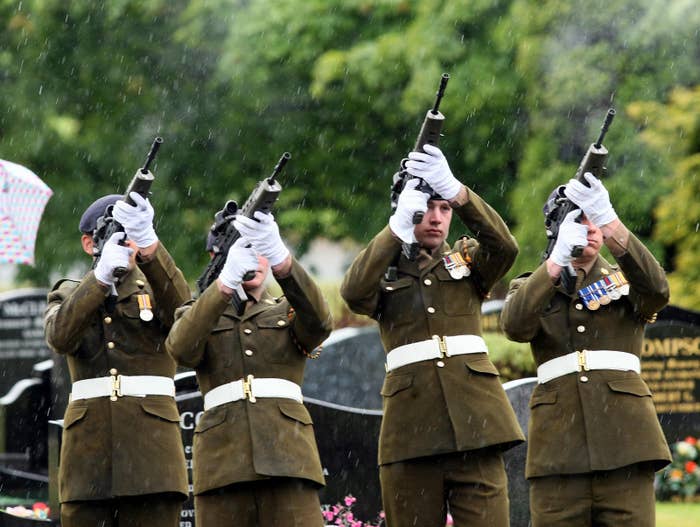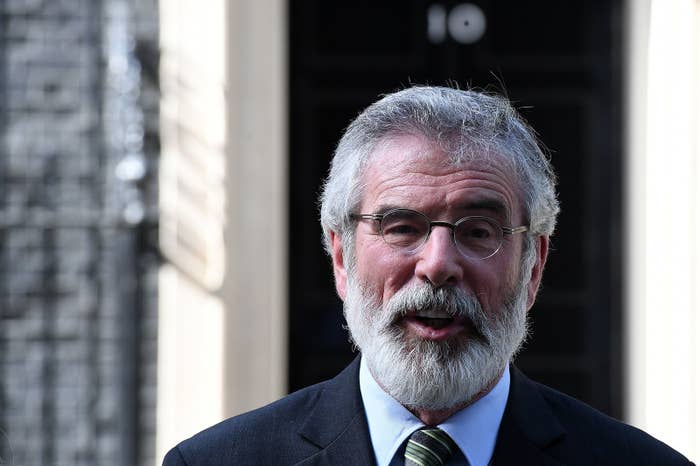
The Democratic Unionist Party has secured a controversial policy guaranteeing preferential treatment for British soldiers in Northern Ireland as part of its deal with the Conservative party.
The military covenant, which was introduced in the rest of the UK in 2000, entitles former army personnel and their families priority access to healthcare, as well as school places for their children. The policy was introduced in Great Britain to address homelessness and poor healthcare rates among former soldiers.
However, attempts to extend the covenant to Northern Ireland have previously been fiercely opposed by nationalist politicians in the region, who argue the policy may amount to a breach of the Good Friday Agreement. It was due to such a potential reaction that Tony Blair did not include Northern Ireland in the covenant when it was initially codified.
Under the peace treaty the government cannot give preferential treatment to either the Catholic community or the Protestant community in Northern Ireland. As Northern Irish soldiers in the British army are primarily Protestants and very few Catholics join its ranks, it has been argued that the covenant would therefore breach equality legislation in giving Protestants an unfair advantage.
Six of the 11 Northern Ireland local authorities have signed the covenant. However, Ministry of Defence sources say there are "firm links" with all 11, with all committed to ensuring that no veteran is unfairly disadvantaged.
News that the covenant will be included in the DUP-Conservative agreement has been criticised by nationalist politicians in Northern Ireland today.
The leader of Republican party Sinn Féin, Gerry Adams, said: “Sinn Féin will vigorously pursue the rights of citizens currently being denied by the DUP and the British government. We are committed to equality. Sinn Fein will resolutely oppose any attempt to give preferential treatment to British forces, either in terms of legacy or the provision of public services.
“If as they claim in today’s agreement, both the Tories and the DUP will fully adhere fully to the Good Friday Agreement and its successors, they need to deliver on this for the political institutions can be restored.”

Colum Eastwood, the leader of the moderate nationalist Social Democratic and Labour Party, which also opposes extension of the military covenant, said the money spent in Northern Ireland as a result of the deal must be "targeted at areas of need, not the parochial priorities of one political party". He added that "any position which attempts to wrestle power back from a local executive will be opposed in the strongest possible terms".
In an addendum to the document released by 10 Downing Street detailing the financial aspects of the deal, the Conservatives also issued a statement in support of the British army’s role in the Troubles in Northern Ireland – another move that is likely to anger nationalists in the region.
In recent years, a deeply divisive and bitter debate has emerged in Northern Ireland about the role of the British army during the Troubles. The armed forces were deployed into the region during the conflict, with a view to restoring order amid growing sectarian violence. However, the army has been accused of engaging in gratuitous and sectarian violence against innocent Catholics, including children. The most famous such case was that of Bloody Sunday, when soldiers were accused of indiscriminately murdering 14 innocent people on a civil rights march.
In recent years, a number of British soldiers have been prosecuted, as victims’ families seek justice before the accused die of old age. However, some loyalists and unionists in Northern Ireland have opposed the prosecutions, saying they are unfair and amount to a witch hunt against British soldiers who were merely trying to protect people during the Troubles. The DUP has called for an end to what they call “unfair” cases against them.
The DUP-Conservative pact states that: “Both parties reiterate their admiration for the courage and sacrifice of the police and armed forces in upholding democracy and the rule of law and never forget the debt of gratitude we owe them.” It continues that approaches to “victims and survivors” must “be established so as to operate in ways that are fair, balanced and proportionate and which do not focus unfairly on members of the armed forces or police".
Sinn Féin politician Gerry Kelly has previously rejected any calls for an end to prosecution of British soldiers as "an insult to victims and survivors", saying "there can be no immunity for people who have murdered Irish citizens".
Inclusion of the statement in favour of the British army’s role in the Troubles at the end of the DUP-Conservative pact document today is likely to fuel concern among the nationalist community in Northern Ireland that such prosecutions may be resisted.
Following the general election earlier this month in which Theresa May's Conservatives failed to achieve a majority at Westminster, May approached the DUP offering a pact with her party. The DUP’s 10 MPs have agreed to enter an informal arrangement rather than an official coalition, which will be based on a vote-by-vote form of demand and supply.
In exchange for their support, the DUP has secured a pledge of £1 billion funding from the Conservatives in Northern Ireland, as well as support for British troops. It will be spent on areas including healthcare, schools, infrastructure projects, and increasing access to high speed broadband.
An MoD spokesperson said: “We are absolutely committed to the wellbeing of all of our Armed Forces – whether serving or former. The Covenant was set up and enshrined in law to make sure no one is disadvantaged by their service life.”
